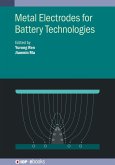Energy storage is the process of storing produced energy for later use. An energy storage device, often known as a battery or accumulator, converts chemical energy into electric energy through a chemical reaction.
The prosperity and growth of modern societies rely heavily on having enough energy, whether in the form of fuel or electric power. Fossil fuels, the leading producer of energy, have become one of the most contentious issues globally. The continual depletion of fossil fuels, such as oil, gas, hard coal, and lignite, which have caused a wide range of environmental and societal issues, emphasises the need for a sustainable, clean, and abundant energy source.
The world population growth demands for not only for more electric energy but also environmentally sound solutions. Numerous efforts have been taken for development of materials for environment friendly energy generation and storage devices with more power and energy density. Among the growing technologies, extensive research on devices like, secondary batteries, and supercapacitors, have been done worldwide. This book covers the fundamentals, working mechanisms, electrode materials, challenges, and opportunities for energy storage devices of Lithium-ion and Lithium-sulfur battery technology.
Researchers, post graduate and graduate students working in the fields of energy, electrochemistry, materials science and nanoscience are the target audience for this research text. Professionals in the fields of energy, nanotechnology, and the automotive industry for e-vehicles will also find the book interesting.
Key Features:
The prosperity and growth of modern societies rely heavily on having enough energy, whether in the form of fuel or electric power. Fossil fuels, the leading producer of energy, have become one of the most contentious issues globally. The continual depletion of fossil fuels, such as oil, gas, hard coal, and lignite, which have caused a wide range of environmental and societal issues, emphasises the need for a sustainable, clean, and abundant energy source.
The world population growth demands for not only for more electric energy but also environmentally sound solutions. Numerous efforts have been taken for development of materials for environment friendly energy generation and storage devices with more power and energy density. Among the growing technologies, extensive research on devices like, secondary batteries, and supercapacitors, have been done worldwide. This book covers the fundamentals, working mechanisms, electrode materials, challenges, and opportunities for energy storage devices of Lithium-ion and Lithium-sulfur battery technology.
Researchers, post graduate and graduate students working in the fields of energy, electrochemistry, materials science and nanoscience are the target audience for this research text. Professionals in the fields of energy, nanotechnology, and the automotive industry for e-vehicles will also find the book interesting.
Key Features:
- Provides all fundamentals of lithium-ion and lithium-sulfur battery technology
- Requirements of each component ideal for electrochemical performance will be detailed
- Features, advantages, disadvantages, and efforts to enhance perforce of each class of material used will be provided
- Discusses recent trends and future technological applications
Dieser Download kann aus rechtlichen Gründen nur mit Rechnungsadresse in A, D ausgeliefert werden.









